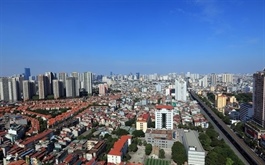Property developers, brokers, low-income laborers in misery in Vietnam
Property developers, brokers, low-income laborers in misery in Vietnam
Both real estate developers, brokers, and millions of low-income laborers are reeling from spiking property prices in Vietnam.

Real estate projects in Thu Duc City, a district-level unit in Ho Chi Minh City. Photo: Quang Dinh / Tuoi Tre |
Low-income earners are in dire need of affordable housing with many living in boarding houses.
The prices of houses and apartments in cities are leaping, some realty fetching VND20-30 million (US$788-1,181) per square meter.
While applications pour in for social housing projects and credit packages aimed at aiding low-income residents, the actual number of approvals remains disappointingly low.
However, housing prices are surging continuously, shattering the needy's dream of owning houses in cities.
Property developers claimed supply is scarce, even though many completed projects are left unoccupied.
In Ho Chi Minh City, per capita income was $6,868 in 2023, while commercial houses cost nearly VND50 million ($1,968) per square meter at the minimum.
Data currently estimates fresh university graduates would need to work for a decade to earn a monthly salary of VND15-20 million (591-788) or higher, which leaves everyone wondering when they are able to buy a house in the city.
People who can afford houses in urban areas are also in misery as they have no home ownership certificates.
Meanwhile, realty developers are crying for help as many of their projects are at a standstill due to legal obstacles. They have claimed to have to suffer increasing interest on bank loans, resulting in hefty housing prices.
The unpredictable growth of the real estate market has not only negatively impacted low-income workers, but it has also made it hard for the government to collect tax and stunted local economic development.
Once projects are suspended over legal bottlenecks, construction workers in the cement, iron, and steel industries plus furniture enterprises have no contracts.
While Vietnam has developed and amended three real estate market-related laws, the market has yet to thrive as expected.
Most low-income laborers still pin high hopes on owning houses thanks to the support of the national government.
Consequently, both citizens and businesses are eagerly anticipating the National Assembly's specialized oversight of real estate market management and social housing development from 2015 to the end of 2023, in order to address current challenges, ultimately bringing relief to those burdened by realty woes.




























